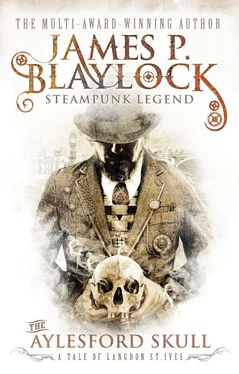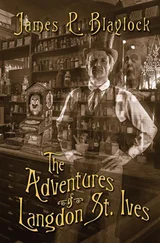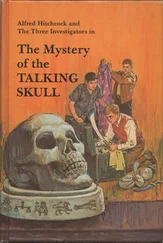James Blaylock - The Aylesford Skull
Здесь есть возможность читать онлайн «James Blaylock - The Aylesford Skull» весь текст электронной книги совершенно бесплатно (целиком полную версию без сокращений). В некоторых случаях можно слушать аудио, скачать через торрент в формате fb2 и присутствует краткое содержание. Жанр: sf_stimpank, на английском языке. Описание произведения, (предисловие) а так же отзывы посетителей доступны на портале библиотеки ЛибКат.
- Название:The Aylesford Skull
- Автор:
- Жанр:
- Год:неизвестен
- ISBN:нет данных
- Рейтинг книги:5 / 5. Голосов: 1
-
Избранное:Добавить в избранное
- Отзывы:
-
Ваша оценка:
- 100
- 1
- 2
- 3
- 4
- 5
The Aylesford Skull: краткое содержание, описание и аннотация
Предлагаем к чтению аннотацию, описание, краткое содержание или предисловие (зависит от того, что написал сам автор книги «The Aylesford Skull»). Если вы не нашли необходимую информацию о книге — напишите в комментариях, мы постараемся отыскать её.
The Aylesford Skull — читать онлайн бесплатно полную книгу (весь текст) целиком
Ниже представлен текст книги, разбитый по страницам. Система сохранения места последней прочитанной страницы, позволяет с удобством читать онлайн бесплатно книгу «The Aylesford Skull», без необходимости каждый раз заново искать на чём Вы остановились. Поставьте закладку, и сможете в любой момент перейти на страницу, на которой закончили чтение.
Интервал:
Закладка:
“All right. Sawyer it is. At Smith’s.”
“And one other thing. I can tell you that the Doctor’s been seen on the river. Not much happens on the river that I don’t hear of sooner or later. Could be he’s turned pirate or smuggler or both down around Egypt Bay, back in the marsh. More than one boat’s been lost out there on a black night this last six months, one just a few weeks back, or so says a boy who was fished out of the river. Two others who were fished out dead weren’t so talkative.”
SIXTEEN
“Iwonder if your master is in,” St. Ives said to the boy who was sweeping the footpath in front of Slocumb’s Millinery in Cheapside. “I owe him a small debt. Perhaps you would step inside and tell Mr. Slocumb that Langdon St. Ives would like to settle up. Tell him it has to do with the business of the illustrations by Joseph Banks. Can you remember all that?” He handed the boy a shilling to cement his memory and then sent him inside. St. Ives made himself visible in the sunshine, so that Slocumb might glimpse him through the window. He wanted to put the wind up the man.
There were dozens of hats on display in the window, hung on wooden hooks and perched high on top of wooden heads. The shop was gaily painted and well kept: no dust, no dead flies behind the glass. The prices were genteel. From what St. Ives could see there were no customers in the shop, and he wondered whether the manufacture of hats turned any sort of profit, or whether Slocumb depended on more interesting pursuits. St. Ives studied his own reflection in the bright glass, not entirely happy with what he saw, but he assumed that Slocumb was also studying it, unhappy for other reasons entirely.
He heard footsteps approaching behind him, and he looked back into the surprised face of the very woman to whom he had given five crowns, whose husband was now a two-weeks-old memory. She stopped and stared at him, as if trying to make sense of his presence, just as he was trying to make sense of hers. And then she shifted her eyes and stepped past him and into Slocumb’s without a word spoken, her presence both a mystery and a complication.
St. Ives had only a moment to contemplate this before there sounded a whistle from the back of the shop, and he set off at a run around the edge of the building, where he found Hasbro holding a resigned Slocumb by the collar some few feet from the rear door. Slocumb was a nondescript man, of medium height and build, the sort of man one might glance at but not really see – a useful anonymity if one were describing him to the police. He wore spectacles that were contrived to make him appear owlishly studious, worn low on his nose, which gave him an appearance of condescension. His demeanor changed again when he removed the spectacles, as he did now. It seemed to St. Ives that there was no fear about him, however, but something more like resignation.
“That wheeze with the notebooks fell out badly,” Slocumb started to say, no denial in his face or tone, when the rear door of the shop flew open and the woman from the street came out with a heather broom, which she swung first at St. Ives, clipping him on the shoulder, before turning to Hasbro, who shifted on his feet so that it was Slocumb who took the blow on the side of his head. She descended again upon St. Ives again, who trod back toward the street, putting up his hands and managing to wrench the broom from her grasp. He pitched it over the wall behind him and stood his ground, hoping to God that she would come to her senses. It was Slocumb who rescued him. Hasbro had set him free, and the man put his hands on the woman’s shoulders now, and guided her weeping back into the shop, shutting the door behind her and shaking his head sadly. St. Ives found that he was shaken by the woman’s anger, which he not only understood, but admired and feared.
“She’s here to pick up little Claire, sir,” Slocumb told them. “They’ll be off to gather up young James, who studies at Mr. Markham’s Day School. He’s a bright lad, is Jimmy, and Jenny’s fixed on the idea that he’ll come to something, and not have to pick up a living on the streets like his poor father. Perhaps you’d give me a moment to lock the street door behind her?”
“I could attend to the shop,” Hasbro said, “and leave you gentlemen to discuss business. I worked in the trade, Mr. Slocumb, when I was a young man – Benson’s Millinery off Euston Square.”
“Old man Benson!” Slocumb said, momentarily cheered by the memory. “I was fond of Benson, although he was an eccentric of the first water. He died some few months back, I’m sorry to say. Well… Thank you, sir. I’d be grateful if you’d step in. It’s best to keep regular hours. Nothing worse than customers fagging down here for nought.”
Hasbro nodded and went in through the door. St. Ives listened for sounds of a confrontation, his own friends naturally being the woman’s enemies. But there was nothing. If anyone could calm the waters, it would be Hasbro. Jenny and Claire and Jimmy – three names to go along with the faces. A few minutes ago, in front of the shop, the sight of the woman had brought that night on the street back into his mind with vivid clarity, and now the names finished the tale. He wished that Slocumb hadn’t named the children, who might have remained indistinct shadows. Then he thought of Eddie and of the perils of indecision – nothing indistinct there.
“You say that the business went badly,” he said to Slocumb, getting to the point. “That’s coming at it a little mild, I should think.”
“In that we agree. How did you know to find me? Not that I’ve any business putting questions to you.” He stepped back into the shadow of the building, out of the remains of the day’s sunlight, which was still quite warm.
“The unfortunate man who died that night,” St. Ives said, “he knew me the instant he saw me, but it was just today the reason came into my mind. I had seen him at Merton’s on two or three occasions, going out on deliveries. I remembered the limp as well as his face. The rest followed.”
“That was my nephew, George, sir. I wondered why he had bolted that night. That wasn’t his way. He could brass it out in front of Lucifer himself. I suspected that he twigged that something was amiss and ran, but I had no idea it was you. When Jenny just now told me the truth of it, seeing you on the street as she did, I bolted, just like George. I couldn’t stand a stint in Newgate, sir, not at my age, and no one to take care of Jenny and the little ones now that George is dead.”
“I assume that the notebooks were frauds,” St. Ives said, “two sets of frauds, one perfectly believable and one flawed. Merton’s contrived them both, no doubt.”
“No, sir,” Slocumb said. “Merton found the notebooks right enough in an old trunk at Banks’s home in Lincolnshire, in the Abbey. They’d been stored away this last century. Miraculous discovery, but you know Merton. He hears a rumor from a crow’s mouth and then follows the bird to its nest.”
“The ubiquitous old trunk, you say? Forgive me, but it’s always the old trunk. I’ve seen Merton’s work. I’ve profited from it, in my way. I’ve looked through his workroom – old paper, doctored ink, chemicals of all sorts. He can work marvels with weak tea and garden soil. William Henry Ireland was an amateur compared to Merton. It stands to reason that he mugged up Banks’s early work and fabricated the notebooks himself. I believe that you negotiated the sale to the Royal Society, not naming Merton. When the fraudulent work was authenticated you contrived to have the notebooks replaced with the second, inferior set. Merton recovered the first set that way along with the papers that authenticated them, and sued for the money that was owed him for the lost set, which wasn’t lost at all, but was once again in his possession. And of course he could resell it in due time, with the authentication papers in order. The Royal Society had a reputation to protect, and admitting to the whole business would mean scandal, which eliminated the police, and thus I found myself involved in this ill-conceived plan to re-purchase the stolen notebooks. Whose idea was it to sell them back to the Royal Society, I wonder? That was brilliant – a swindle on top of a swindle.”
Читать дальшеИнтервал:
Закладка:
Похожие книги на «The Aylesford Skull»
Представляем Вашему вниманию похожие книги на «The Aylesford Skull» списком для выбора. Мы отобрали схожую по названию и смыслу литературу в надежде предоставить читателям больше вариантов отыскать новые, интересные, ещё непрочитанные произведения.
Обсуждение, отзывы о книге «The Aylesford Skull» и просто собственные мнения читателей. Оставьте ваши комментарии, напишите, что Вы думаете о произведении, его смысле или главных героях. Укажите что конкретно понравилось, а что нет, и почему Вы так считаете.










